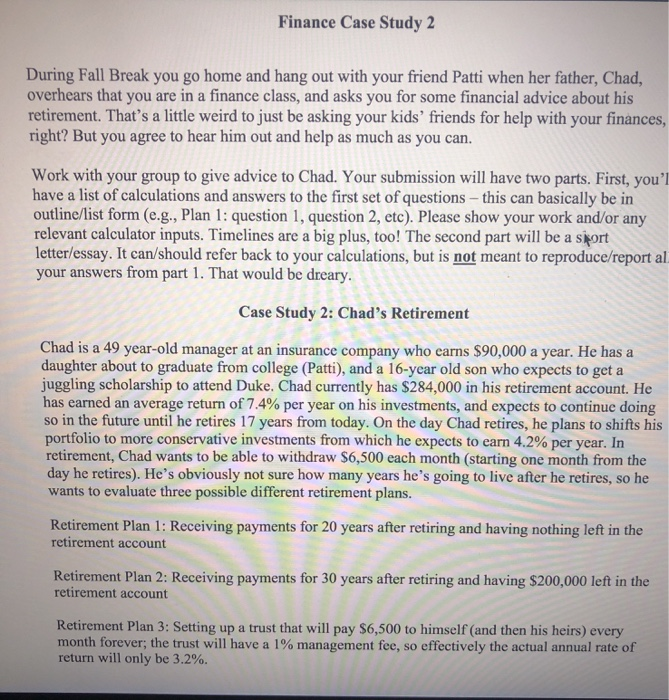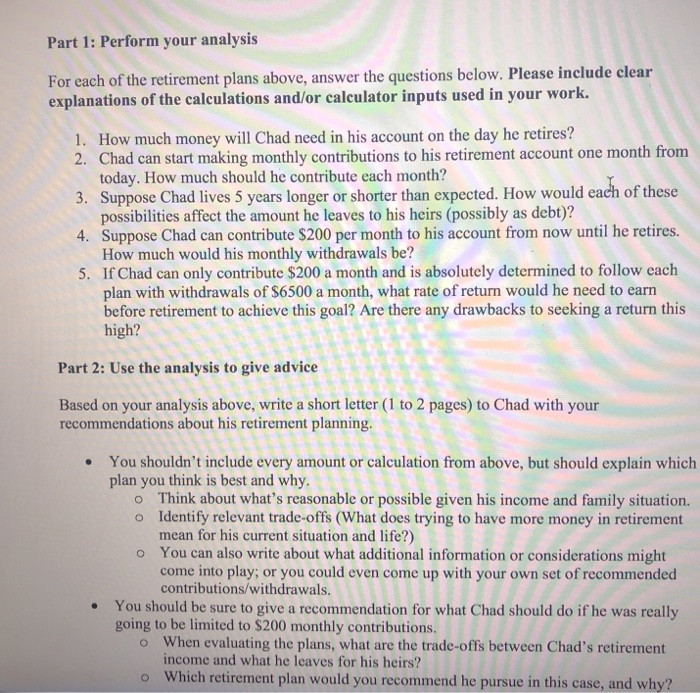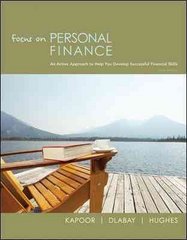Finance Case Study 2 During Fall Break you go home and hang out with your friend Patti when her father, Chad, overhears that you are in a finance class, and asks you for some financial advice about his retirement. That's a little weird to just be asking your kids' friends for help with your finances, right? But you agree to hear him out and help as much as you can. Work with your group to give advice to Chad. Your submission will have two parts. First, you'll have a list of calculations and answers to the first set of questions - this can basically be in outline/list form (e.g., Plan 1: question 1, question 2, etc). Please show your work and/or any relevant calculator inputs. Timelines are a big plus, too! The second part will be a sport letter/essay. It can/should refer back to your calculations, but is not meant to reproduce/report al your answers from part 1. That would be dreary. Case Study 2: Chad's Retirement Chad is a 49 year-old manager at an insurance company who earns $90,000 a year. He has a daughter about to graduate from college (Patti), and a 16-year old son who expects to get a juggling scholarship to attend Duke. Chad currently has $284,000 in his retirement account. He has earned an average return of 7.4% per year on his investments, and expects to continue doing so in the future until he retires 17 years from today. On the day Chad retires, he plans to shifts his portfolio to more conservative investments from which he expects to earn 4.2% per year. In retirement, Chad wants to be able to withdraw $6,500 each month (starting one month from the day he retires). He's obviously not sure how many years he's going to live after he retires, so he wants to evaluate three possible different retirement plans. Retirement Plan 1: Receiving payments for 20 years after retiring and having nothing left in the retirement account Retirement Plan 2: Receiving payments for 30 years after retiring and having $200,000 left in the retirement account Retirement Plan 3: Setting up a trust that will pay $6,500 to himself and then his heirs) every month forever; the trust have a 1% management fee, so effectively the actual annual rate of return will only be 3.2%. Part 1: Perform your analysis For each of the retirement plans above, answer the questions below. Please include clear explanations of the calculations and/or calculator inputs used in your work. 1. How much money will Chad need in his account on the day he retires? 2. Chad can start making monthly contributions to his retirement account one month from today. How much should he contribute each month? 3. Suppose Chad lives 5 years longer or shorter than expected. How would each of these possibilities affect the amount he leaves to his heirs (possibly as debt)? 4. Suppose Chad can contribute $200 per month to his account from now until he retires. How much would his monthly withdrawals be? 5. If Chad can only contribute $200 a month and is absolutely determined to follow each plan with withdrawals of $6500 a month, what rate of return would he need to earn before retirement to achieve this goal? Are there any drawbacks to seeking a return this high? Part 2: Use the analysis to give advice Based on your analysis above, write a short letter (1 to 2 pages) to Chad with your recommendations about his retirement planning. O You shouldn't include every amount or calculation from above, but should explain which plan you think is best and why. Think about what's reasonable or possible given his income and family situation. Identify relevant trade-offs (What does trying to have more money in retirement mean for his current situation and life?) You can also write about what additional information or considerations might come into play, or you could even come up with your own set of recommended contributions/withdrawals. You should be sure to give a recommendation for what Chad should do if he was really going to be limited to $200 monthly contributions. o When evaluating the plans, what are the trade-offs between Chad's retirement income and what he leaves for his heirs? o Which retirement plan would you recommend he pursue in this case, and why? . Finance Case Study 2 During Fall Break you go home and hang out with your friend Patti when her father, Chad, overhears that you are in a finance class, and asks you for some financial advice about his retirement. That's a little weird to just be asking your kids' friends for help with your finances, right? But you agree to hear him out and help as much as you can. Work with your group to give advice to Chad. Your submission will have two parts. First, you'll have a list of calculations and answers to the first set of questions - this can basically be in outline/list form (e.g., Plan 1: question 1, question 2, etc). Please show your work and/or any relevant calculator inputs. Timelines are a big plus, too! The second part will be a sport letter/essay. It can/should refer back to your calculations, but is not meant to reproduce/report al your answers from part 1. That would be dreary. Case Study 2: Chad's Retirement Chad is a 49 year-old manager at an insurance company who earns $90,000 a year. He has a daughter about to graduate from college (Patti), and a 16-year old son who expects to get a juggling scholarship to attend Duke. Chad currently has $284,000 in his retirement account. He has earned an average return of 7.4% per year on his investments, and expects to continue doing so in the future until he retires 17 years from today. On the day Chad retires, he plans to shifts his portfolio to more conservative investments from which he expects to earn 4.2% per year. In retirement, Chad wants to be able to withdraw $6,500 each month (starting one month from the day he retires). He's obviously not sure how many years he's going to live after he retires, so he wants to evaluate three possible different retirement plans. Retirement Plan 1: Receiving payments for 20 years after retiring and having nothing left in the retirement account Retirement Plan 2: Receiving payments for 30 years after retiring and having $200,000 left in the retirement account Retirement Plan 3: Setting up a trust that will pay $6,500 to himself and then his heirs) every month forever; the trust have a 1% management fee, so effectively the actual annual rate of return will only be 3.2%. Part 1: Perform your analysis For each of the retirement plans above, answer the questions below. Please include clear explanations of the calculations and/or calculator inputs used in your work. 1. How much money will Chad need in his account on the day he retires? 2. Chad can start making monthly contributions to his retirement account one month from today. How much should he contribute each month? 3. Suppose Chad lives 5 years longer or shorter than expected. How would each of these possibilities affect the amount he leaves to his heirs (possibly as debt)? 4. Suppose Chad can contribute $200 per month to his account from now until he retires. How much would his monthly withdrawals be? 5. If Chad can only contribute $200 a month and is absolutely determined to follow each plan with withdrawals of $6500 a month, what rate of return would he need to earn before retirement to achieve this goal? Are there any drawbacks to seeking a return this high? Part 2: Use the analysis to give advice Based on your analysis above, write a short letter (1 to 2 pages) to Chad with your recommendations about his retirement planning. O You shouldn't include every amount or calculation from above, but should explain which plan you think is best and why. Think about what's reasonable or possible given his income and family situation. Identify relevant trade-offs (What does trying to have more money in retirement mean for his current situation and life?) You can also write about what additional information or considerations might come into play, or you could even come up with your own set of recommended contributions/withdrawals. You should be sure to give a recommendation for what Chad should do if he was really going to be limited to $200 monthly contributions. o When evaluating the plans, what are the trade-offs between Chad's retirement income and what he leaves for his heirs? o Which retirement plan would you recommend he pursue in this case, and why








